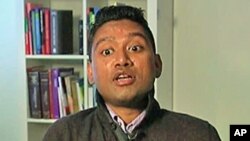As wars break out and end, and refugees flee across international borders, victims often find themselves living alongside their alleged tormentors in foreign and frequently Western nations. Those active and educated in the victim diaspora are looking to legal systems in their new countries to redress alleged war crimes. In the U.S. state of Maryland, a first-year law student of Tamil heritage accuses the brother of Sri Lanka's president and a former army general of war crimes against minority Tamils in Sri Lanka.
It’s an average day in contracts class at the University of Baltimore School of Law in Maryland.
The professor poses hypothetical questions as students check e-mail. But Rajeev Sreetharan is not distracted. He’s on a mission to bring what he calls justice to the Tamils of Sri Lanka through the legal systems of the West.
"When you look at the history of transitional justice from Nuremberg to Darfur, it’s only a select number of people who have gotten justice and who have been given the opportunity for their suffering to be written in history," said Rajeev Sreetharan.
In 2009, Sreetharan, and colleagues from the international diaspora group Tamils Against Genocide, compiled a document accusing former Sri Lankan Army General Sarath Fonseka and current Defense Minister Gotabhaya Rajapaksa of genocide against minority Tamils during that country's long-running civil war. Gotabhaya Rajapaksa is the brother of Sri Lankan President Mahinda Rajapaksa.
The United Nations estimates 7,000 civilians died during the final phase of Sri Lanka's civil war, which ended in 2009. Both the Sri Lankan army and the Tamil rebels have been accused of abuses.
The Sri Lankan Embassy in Washington refused to comment on Streetharan's accusations, but President Rajapaksa told Sri Lanka's Daily News newspaper last month:
"...the so-called diaspora seeks to tarnish my image, and bring me and those who led the humanitarian operation to defeat LTTE terror before international tribunals."
Mr. Rajapaksa invited Tamil expatriates to return to Sri Lanka to witness the actual situation there.
Washington attorney Bruce Fein asked the U.S. Justice Department to investigate Streetharan's accusations, but he has not heard back about any investigation.
"It was a compilation of over 1,000 pages going back for decades of disappearances, starvations, bombings, assassinations of Tamils," said Fein. "These were Tamils that were not on the battlefield and were documented from a variety of sources."
Fein says Gotabhaya Rajapaksa is a U.S. citizen and Fonseka, jailed following a failed election challenge to the president, has a U.S. green card. He says this makes them vulnerable to U.S. law.
"The United States is a signatory to the Genocide Convention of 1948 and there is a genocide law that prohibits any U.S. citizen from complicity in genocide wherever it is committed," he said.
Fein says he doubts the current Sri Lankan government will extradite the president’s brother or the jailed army general, but he says governments do change.
Back on campus, Sreetharan finishes class and heads to his apartment to get to work. He acknowledges that the various cases he is working on are long-shots, but he says he'll keep at it.
He describes how today’s instant communication makes it all possible.
"The spread of media, Internet, Facebook, all these things you can basically empower the victim community to engage with the court directly," he said.
Sreetharan left an investment banking career on Wall Street to pursue justice issues.
He’s in a hurry. He has muscular dystrophy and over time he will lose strength and mobility. His life, he says, could be short.
"When the doctor starts telling you that you are going to get weaker and weaker then you want to make every day count," said Sreetharan.
Tamil rebels fought the Sri Lankan government for 25 years. They are accused of many atrocities themselves, but bringing them to justice, says Sreetharan, is someone else’s fight.




